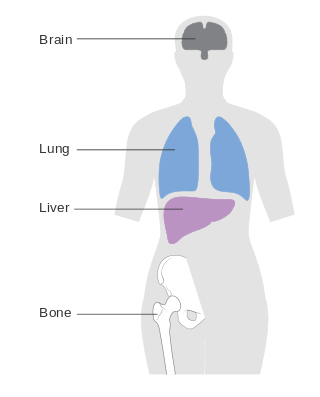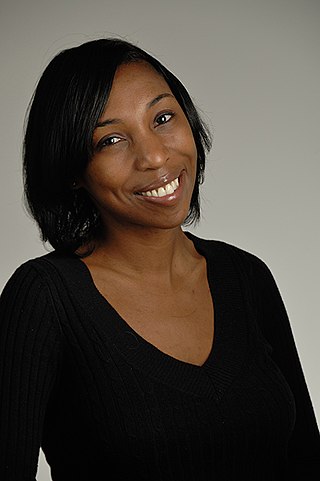Related Research Articles

Metastasis is a pathogenic agent's spread from an initial or primary site to a different or secondary site within the host's body; the term is typically used when referring to metastasis by a cancerous tumor. The newly pathological sites, then, are metastases (mets). It is generally distinguished from cancer invasion, which is the direct extension and penetration by cancer cells into neighboring tissues.
Mina J. Bissell is an Iranian-American biologist known for her research on breast cancer. In particular, she has studied the effects of a cell's microenvironment, including its extracellular matrix, on tissue function.
Intravasation is the invasion of cancer cells through the basement membrane into a blood or lymphatic vessel. Intravasation is one of several carcinogenic events that initiate the escape of cancerous cells from their primary sites. Other mechanisms include invasion through basement membranes, extravasation, and colonization of distant metastatic sites. Cancer cell chemotaxis also relies on this migratory behavior to arrive at a secondary destination designated for cancer cell colonization.

E-selectin, also known as CD62 antigen-like family member E (CD62E), endothelial-leukocyte adhesion molecule 1 (ELAM-1), or leukocyte-endothelial cell adhesion molecule 2 (LECAM2), is a selectin cell adhesion molecule expressed only on endothelial cells activated by cytokines. Like other selectins, it plays an important part in inflammation. In humans, E-selectin is encoded by the SELE gene.

Eribulin, sold under the brand name Halaven, is an anticancer medication used to treat breast cancer and liposarcoma.
Danny Ray Welch is an American cancer biologist and founding director of the University of Kansas Medical Center's Department of Cancer Biology. Welch is also a professor at the University of Kansas School of Medicine and director of the National Foundation for Cancer Research (NFCR) Center for Metastasis Research at KU. His research is in the area of metastasis suppressor genes and the biology of metastasis.

Metastatic breast cancer, also referred to as metastases, advanced breast cancer, secondary tumors, secondaries or stage IV breast cancer, is a stage of breast cancer where the breast cancer cells have spread to distant sites beyond the axillary lymph nodes. There is no cure for metastatic breast cancer; there is no stage after IV.

Joan Massagué, is a Spanish biologist and the current director of the Sloan Kettering Institute at Memorial Sloan Kettering Cancer Center. He is also an internationally recognized leader in the study of both cancer metastasis and growth factors that regulate cell behavior, as well as a professor at the Weill Cornell Graduate School of Medical Sciences.
Breast cancer metastatic mouse models are experimental approaches in which mice are genetically manipulated to develop a mammary tumor leading to distant focal lesions of mammary epithelium created by metastasis. Mammary cancers in mice can be caused by genetic mutations that have been identified in human cancer. This means models can be generated based upon molecular lesions consistent with the human disease.
Zena Werb was a professor and the Vice Chair of Anatomy at the University of California, San Francisco. She was also the co-leader of the Cancer, Immunity, and Microenvironment Program at the Hellen Diller Family Comprehensive Cancer Center and a member of the Executive Committee of the Sabre-Sandler Asthma Basic Research Center at UCSF. Her research focused on features of the microenvironment surrounding cells, with particular interest in the extracellular matrix and the role of its protease enzymes in cell signaling.

Denis Wirtz is the vice provost for research and Theophilus Halley Smoot Professor of Engineering Science at Johns Hopkins University. He is an expert in the molecular and biophysical mechanisms of cell motility and adhesion and nuclear dynamics in health and disease.

J. William Harbour is an American ophthalmologist, ocular oncologist and cancer researcher. He is Chair of the Department of Ophthalmology at the University of Texas Southwestern Medical Center in Dallas. He previously served as the vice chair and director of ocular oncology at the Bascom Palmer Eye Institute and associate director for basic science at the Sylvester Comprehensive Cancer Center of the University of Miami's Miller School of Medicine.
Hartmut Beug (1945–2011) was a German cancer biologist who studied how groups of oncogenes interact to lead to the development and spread of cancer. Shortly before his death, a foundation was set up in his and his wife’s name to support collaboration among young scientists and their studies in the field of metastasis.

4T1 is a breast cancer cell line derived from the mammary gland tissue of a mouse BALB/c strain. 4T1 cells are epithelial and are resistant to 6-thioguanine. In preclinical research, 4T1 cells have been used to study breast cancer metastasis as they can metastasize to the lung, liver, lymph nodes, brain and bone. The cells are known to be highly aggressive in live tissues.
Ashani Tanuja Weeraratna is a Sri Lanka-born American cancer researcher whose findings are contributing to the scientific understanding of melanoma tumors. She is a Bloomberg Distinguished Professor of cancer biology and the E.V. McCollum Professor and Chair of the department of biochemistry and molecular biology at the Johns Hopkins Bloomberg School of Public Health. Weeraratna is a member of the National Cancer Advisory Board, which advises and assists the director of the National Cancer Institute on the activities of the national cancer program.
Invasion is the process by which cancer cells directly extend and penetrate into neighboring tissues in cancer. It is generally distinguished from metastasis, which is the spread of cancer cells through the circulatory system or the lymphatic system to more distant locations. Yet, lymphovascular invasion is generally the first step of metastasis.

Catherine D. Nobes is a Professor of Cell Biology and Head of School of Biochemistry at the University of Bristol. She studies the regulation of cell migration and invasion of cancer cells by Eph receptors.

Kandice Tanner is a Trinidad and Tobago biophysicist researching the metastatic traits that allow tumor cells to colonize secondary organs. She is a Senior Investigator at the National Cancer Institute, where she is head of the Tissue morphodynamics section.
Ernst Robert Lengyel is an American gynecologic oncologist. Lengyel is the Arthur L. and Lee G. Herbst Professor of Obstetrics and Gynecology at the University of Chicago. Lengyel directs the Ovarian Cancer Research Laboratory, a translational research laboratory focused on understanding ovarian cancer metastasis and on developing and testing new treatments for ovarian cancer. In this role, Lengyel and his research team began to investigate the role of the fallopian tube in ovarian cancer as the cells more closely resemble those in the fallopian tube rather than the ovary.

Sendurai A. Mani is an Indian-American oncologist and a Molecular Bilogist. He is a fellow of the American Association for the Advancement of Sciences, and Dean's Chair for Translational Oncology at Brown University Warren Alpert Medical School. He is also the associate director for Translational Oncology at the Legorreta Cancer Center at Alpert Medical School, Brown University. Previously, he was a co-director of Metastasis Research Center and co-director, the Center for Stem Cell & Developmental Biology, and a professor of Translational Molecular Pathology at MD Anderson Cancer Center.
References
- 1 2 3 4 5 6 7 8 9 "Andrew Ewald, Ph.D. – Department of Cell Biology at Johns Hopkins University School of Medicine" . Retrieved 2021-09-13.
- 1 2 3 "Andrew Ewald | Researcher". Breast Cancer Research Foundation. 2014-06-17. Retrieved 2021-09-22.
- 1 2 3 4 "Andrew Ewald". Johns Hopkins Biochemistry and Molecular Biology PhD Program. Retrieved 2021-11-24.
- 1 2 3 4 5 6 7 8 Johns Hopkins Medicine (10 March 2021). "Andrew Ewald Named Director of Johns Hopkins Medicine's Department of Cell Biology". Newswise. Retrieved 22 September 2021.
- ↑ "Andrew J. Ewald, PhD". Cellular and Molecular Medicine, Johns Hopkins University. Retrieved 2021-11-24.
- 1 2 3 Spring 2018, Gabriel Popkin / Published (2018-03-12). "Cancer and the artillery of physics". The Hub. Retrieved 2021-11-24.